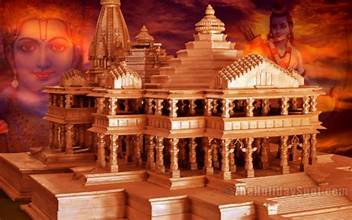The inauguration of the Ram Mandir in Ayodhya is an event of monumental significance, transcending the mere construction of a religious edifice. It symbolizes a pivotal moment in Indian politics, particularly as the nation approaches the 2024 general elections. The Bharatiya Janata Party (BJP) views this as a triumph, a tangible representation of their unwavering commitment to Hindutva ideology. Conversely, for the opposition, navigating the implications of this event is akin to walking a political tightrope.
The BJP’s Victorious Symbol and Opposition’s Conundrum
For the BJP, the Ram Mandir stands as a testament to their ideological steadfastness. It’s not just a temple but a beacon of victory for their Hindutva narrative. This event is expected to play a significant role in the party’s campaign strategy, as they aim to solidify their connection with Hindu voters. Prime Minister Narendra Modi, a key figure in this narrative, is likely to leverage the temple’s inauguration as a highlight of his administration’s achievements.
In stark contrast, the opposition faces a complex scenario. Participating in the event could be seen as an endorsement of the BJP’s religious narrative, yet ignoring it risks alienating a significant portion of the Hindu electorate. This dilemma underscores a deeper issue within the opposition ranks – a need to reassess their approach to secularism and religious politics in India.
Secularism and the Hindu Experience: A Balancing Act
The opposition’s challenge lies in redefining secularism in a way that resonates with the Hindu majority, without succumbing to majoritarian influences. They must acknowledge and respect the diversity of India’s religious landscape while maintaining a stance that is inclusive and respectful of all faiths. This requires a nuanced understanding of secularism, one that is not about denying faith but about embracing the plurality of religious experiences in India.
Political Implications in the Hindi Heartland
The Ram Mandir inauguration holds particular significance in the Hindi heartland, a region historically pivotal in Indian politics. The BJP’s enhanced engagement with the Hindu community post-inauguration presents a formidable challenge to the opposition, especially the Congress party. This necessitates a strategic recalibration for the opposition, emphasizing stronger grassroots connections and broader outreach to bridge the religious and cultural divides.
The Electorate’s Expectation of Clear Vision and Decisiveness
Amidst this backdrop, the electorate’s expectation for clear vision and decisiveness becomes paramount. The BJP, under Modi’s leadership, has been projecting an image of resolution and promise-fulfillment. In contrast, the opposition appears fragmented, often perceived as lacking a unified agenda and a clear roadmap for the nation’s future. This disparity in perception could play a crucial role in the upcoming elections.
Navigating the Ayodhya Ram Mandir Narrative
As the Ram Mandir’s shadow looms over the 2024 elections, the opposition’s strategy in responding to this event will be critical. They must find a delicate balance – recognizing and respecting the religious sentiments of millions while not endorsing the BJP’s monopoly over Hindu narratives. This is more than a political strategy; it’s about affirming a commitment to India’s pluralistic ethos.
The Shifting Landscape of Voter Priorities
The grandeur of the Ram Temple inauguration has the potential to shift the focus of the national discourse, potentially sidelining pressing issues like economic challenges and social policies. Opposition parties need to strategically redirect the conversation towards these critical issues while simultaneously addressing the cultural significance of the temple. Leaders like Rahul Gandhi, Arvind Kejriwal, and Mamata Banerjee are attempting to navigate these waters, showcasing their religious inclinations without overtly politicizing faith.
Disclaimer : इस न्यूज़ पोर्टल को बेहतर बनाने में सहायता करें और किसी खबर या अंश मे कोई गलती हो या सूचना / तथ्य में कोई कमी हो अथवा कोई कॉपीराइट आपत्ति हो तो वह jansandeshonline@gmail.com पर सूचित करें। साथ ही साथ पूरी जानकारी तथ्य के साथ दें। जिससे आलेख को सही किया जा सके या हटाया जा सके ।














